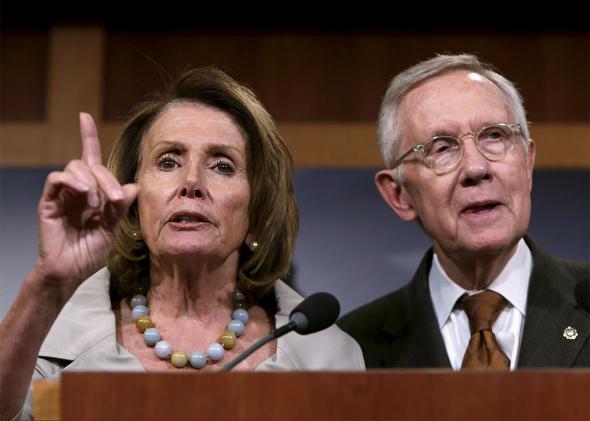Last year, Republican voters were all but promised their very own ponies if they gave the GOP a Senate majority in the midterm elections. Needless to say, they have been disappointed with the legislative progress in the 114th Congress. Depending on how you look at it, Republican leaders are either a) mathematically unable to achieve a laundry list of the ideological goals they promised voters in 2014, or b) spineless clandestine liberal coward frauds. One of these has more merit than the other, but it angries up the blood a little bit less.
Finally, there might be some good news for these GOP voters coming soon thanks to the seemingly boring appropriations process, set to be completed by Dec. 11. Congressional Republican leaders will tuck all sorts of goodies, via “riders,” into a trillion-dollar appropriations package required to keep the government funded through the remainder of the fiscal year. Some—OK, most—of these riders are intended to serve GOP elites’ interests, specifically the many projected riders pertaining to financial, environmental, and campaign finance deregulation. Others, like those attempting to “defund” Planned Parenthood or to block the resettlement of Iraqi and Syrian refugees, will address the GOP base’s favorite shiny objects du jour.
The challenge for Republican leaders is the same straightforward story it always is: to “secure enough concessions from Democrats to mollify the right wing while avoiding the political risks of shutdown brinkmanship,” as Politico puts it.
But the more interesting thread to follow as lawmakers return from holiday is how the White House and congressional Democratic minorities will pick their battles. Republicans quite consciously are throwing so many riders into the mix that Democrats will have to tacitly accept some while throwing their full weight into blocking others. Playing so much defense comes with opportunity costs: homing all of your caucus’ energy into killing one measure glides the path for something equally or more noxious to skirt through undetected.
Corporate lobbyists—who love omnibus spending packages—rely on such tactics. They fancy nothing more than an extended public pissing match over issues like grants for women’s health care centers or whether all refugees are terrorists to redirect public energy away from the garbage they’re trying to sneak through the legislative pipeline on behalf of their garbage clients.
Consider one of the many battlefronts: The Waters of the United States rule, a measure that is going to expand the Environmental Protection Agency’s jurisdiction under the Clean Water Act. House and Senate Republicans intend to block the rule through a policy rider. This has been one of the most high-profile appropriations fights of the year, and some industry lobbyists believe they’ve just caught a major break: Everyone’s talking about refugees now instead of them. The Intercept obtained a recording of a lobbyist strategy session organized by the Edison Electric Institute, a trade association representing utilities, in which participants discussed the fortuitous opportunity that a potential Syrian refugee funding battle presents them. “We’re suddenly not the big issue. … I mean, this is all going to turn on refugees,” one participant said. Another, more generally, believed that the refugee issue has put the White House “on defense,” which creates an atmosphere beneficial to their own situation.
In the “CRomnibus” package that passed this time last year, most Democrats focused their ire on two riders: one to weaken certain rules regulating derivatives and another to loosen campaign finance limits for donations to political parties. These protests didn’t get very far because they came after the appropriations honchos had negotiated a package that included a fair amount of give-and-take. What the focus on these two issues did do, however, was “[obscured] how the CRomnibus boost[ed] special interests at the expense of ordinary people in a host of other ways,” as the journalist David Dayen wrote for the Fiscal Times. Dayen listed more than a dozen other measures tucked into the package that were just as toxic to Democrats as the other two but received considerably less opprobrium. Meanwhile, the White House supported the bill because it got more money to fight ISIS and the Ebola outbreak. (Remember Ebola?)
Sen. Barbara Mikulski, who negotiated on Democrats’ behalf last year in her lame-duck days as chair of the Senate Appropriations Committee, argued that ceding ground to the banks on one or two derivatives rules allowed her to secure more funding for financial regulators and block other items on the bank lobbyists’ wish list. The funny thing about well-paid lobbyists representing the financial services sector, though, is that if you deny them certain riders in one funding bill, they just come back the next year and demand them again—along with new ones. They’re still trying to strangle the Consumer Financial Protection Bureau by limiting its independence. They’re trying to block a proposed Labor Department rule that would protect clients against bad advice from conflicted financial advisers. And they’re also trying to increase the level at which financial institutions count as “systemically important.”
Congressional elections may not seem like they’ve mattered much in recent years, as gridlock has prevented either party from going hog-wild with their most ambitious legislative desires. This appropriations deal—which will include much of the stuff that can’t otherwise pass—will be the first where Republicans’ unified control of Congress is truly felt, though. Democrats will have to lose many important fights in order to win a handful of possibly distracting others. The big question is: Will people even notice?
